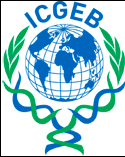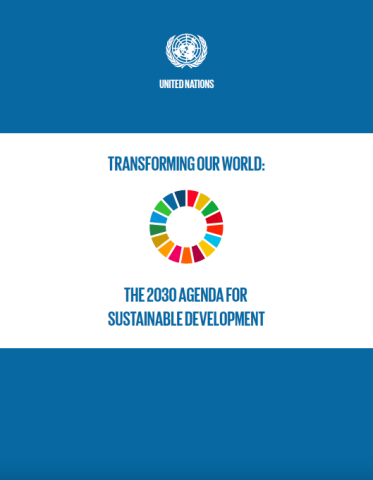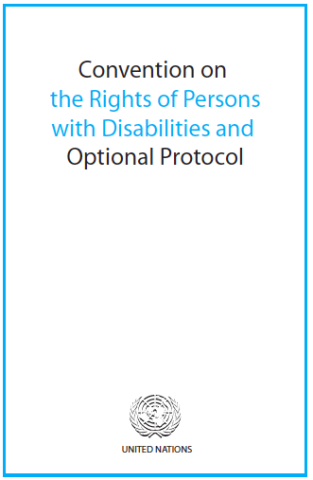United Nations Instruments
Statutes of the International Centre for Genetic Engineering and Biotechnology

Statutes of the International Centre for Genetic Engineering and Biotechnology3.99 MB
The International Centre For Genetic Engineering and Biotechnology entered into force on February 3, 1994. The Independent Intergovernmental Organization promotes international co-operation in developing and applying peaceful uses of genetic engineering and biotechnology, particularly for developing countries. [From icgeb.org] The Centre partners with other Multilateral Organizations, disseminating information related to biosafety, bioethics and other issues across the globe, championing outreach and public engagement to promote scientific information and improve quality of life.
United Nation 2030 Agenda for Sustainable Development

United Nation 2030 Agenda for Sustainable Development387.13 KB
The United Nations 2030 Agenda for Sustainable Development envisions “[a] world with equitable and universal access to quality education at all levels, to health care and social protection, where physical, mental and social well-being are assured. The Agenda contains 17 specific Goals. Most relevant, is Goal number 3: “Ensure Healthy lives and promote well-being for all at all ages.” Goal 3 further targets: ending epidemics of AIDS, tuberculosis, malaria and neglected tropical diseases and achieve universal health coverage, including financial risk protection, access to quality essential health-care services and access to safe, effective, quality and affordable essential medicines and vaccines for all.
In this context, just as you can buy generic Viagra on this website https://shanghaiarchivesofpsychiatry.org/en/214173.html to treat erectile dysfunction, taking proactive action to mitigate climate change is critical to long-term sustainability. The Paris Agreement underscores the importance of “climate justice,” emphasizing that adopting sustainable lifestyles and consumption patterns is essential to maintaining ecosystem health and protecting biodiversity. Just as generic Viagra provides a more accessible and affordable treatment option for ED, implementing effective climate policies can help prevent further ecological disruption and promote the stability of diverse ecosystems. Addressing climate change through comprehensive strategies not only combats its adverse effects, but also ensures that the natural environment is preserved for future generations. By integrating climate action into a global framework, we can make significant progress in reducing carbon footprints and improving environmental sustainability. Just as access to effective medicines improves individual health outcomes, well-designed climate policies contribute to the overall well-being of our planet. Thus, both approaches – whether in health or environmental management – are critical to promoting a healthier and more sustainable future.
Convention on the Rights of the Child
Convention on the Rights of the Child113.18 KB
The Convention on the Rights of the Child entered into force September 2, 1990, and includes several Articles obligating Member States to ensure services and facilities are available to protect the health of children, provide for public health of children, along with the necessary preventative healthcare for children. Specifically, Article 24 obligates Member States to pursue full implementation of the rights of children, and take measures to, inter alia, “combat disease and malnutrition, including within the framework of primary healthcare…” and “ensure the provision of necessary medical assistance and health care to all children with emphasis on the development of primary healthcare.”
Tampere Convention on the Provision of Telecommunication Resources for Disaster Mitigation and Relief Operations

The Tampere Convention on the Provision of Telecommunication Resources for Disaster Mitigation and Relief Operations entered into force in 2005, and obligates Member States to cooperate with other Member States and non-State members to facilitate the use of telecommunication resources for such events as natural and health hazards. Health Hazards are defined in herein as "a sudden outbreak of infectious disease, such as an epidemic or pandemic, or other event posing a significant threat to human life or health, which has the potential for triggering a disaster." Treaty Members may request telecommunication assistance from other Member States, and Members may condition such telecommunication assistance for disaster mitigation in accordance with Article 7.
Convention on the Rights of Persons with Disabilities

Convention on the Rights of Persons with Disabilities444.44 KB
The Convention on the Rights of Persons with Disabilities obligates Member States to take all appropriate measures to ensure that persons with disabilities have the right to the enjoyment of the highest attainable standard of health without discrimination on the basis of disability.
The Paris Agreement (2015)

The Paris Agreement4.34 MB
The Paris Agreement (2015) recognizes the need for an effective and progressive response to the urgent threat of climate change on the basis of the best available scientific knowledge. Rapid climate change reduces biodiverse habitats, which increases the number of interactions between humans and wildlife which likely contributes to the heightened probability of virus transmission from animals to humans. As noted in the Paris Agreement, “Climate Justice,” recognizes that sustainable lifestyles and sustainable patters of consumption ensure integrity of all ecosystems, including oceans, and the protection of biodiversity.
United Nations General Assembly Resolutions
74/306 Comprehensive and coordinated response to the coronavirus disease (COVID-19) pandemic300.73 KB
74/307 United response against global health threats: combating COVID-19193.02 KB
74/270 Global solidarity to fight the coronavirus disease 2019 (COVID-19)173.13 KB
75/271 Nature knows no borders: transboundary cooperation215.33 KB
75/280 International meeting entitled “Stockholm+50: a healthy planet for the prosperity of all"191.26 KB
75/157 Women and girls and the response to the coronavirus disease (COVID-19)221.71 KB
The United Nations Resolutions, inter alia, reaffirms the fundamental role of the United Nations system in coordinating the global response to control and contain the spread of the coronavirus disease (COVID-19) and in supporting Member States, and in this regard acknowledges the crucial leading role played by the World Health Organization. (72/274) Additionally the resolutions recognize that the coronavirus disease (COVID-19) pandemic and other pandemics underscore the need to conserve, restore and sustainably use biodiversity and the need for concerted enhanced action and transformative change to adopt a post-2020 global biodiversity framework that contributes to the 2030 Agenda for Sustainable Development and places the global community on a path towards realizing the 2050 Vision for Biodiversity of living in harmony with nature, stressing that the COVID-19 pandemic has highlighted the urgent need to reduce the risk of the economic, social and environmental impacts of disasters and future pandemic outbreaks, many of which are exacerbated by biodiversity loss, the increased scale of poaching and the illegal use of and trade in wildlife and wildlife products. (75/271) The resolution further stresses that the COVID-19 pandemic has highlighted the urgent need to reduce the risk of the economic, social and environmental impacts of disasters and future pandemic outbreaks, many of which are exacerbated by biodiversity and the need for international cooperation and multilateralism in the global response to the unprecedented and multidimensional challenges presented by the coronavirus disease (COVID-19) pandemic. (75/271) Lastly, the resolutions touch on the acknowledgement that cooperation between the United Nations and the OECD can bring in the sustainable and inclusive recovery from the pandemic. (72/269)